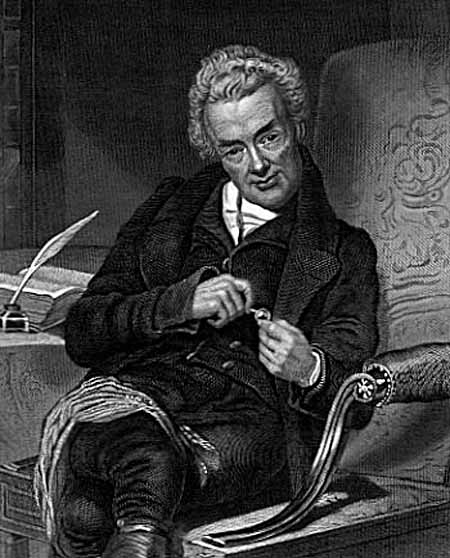
 William Wilberforce (1759 -1833) born Hull, England
William Wilberforce (1759 -1833) born Hull, England
Show/Hide_Details
William Wilberforce was an English politician who became the voice of the abolition movement in Parliament. He was a slightly built man, about five foot three in height, and suffered from bouts of bad health. He was born in Hull, into a rich merchant family. As a child, whilst living with his uncle in London, he was taken to hear John Newton preach. It had a great impression on him but he returned home and soon became part of fashionable society, attending the theatre and races where he watched his own horse run. He enrolled at Cambridge University and became friends with William Pitt. At the age of 21, Wilberforce was elected to Parliament. He was well suited to politics as he was an extremely eloquent speaker and very witty. In 1783 he met James Ramsey and for the first time discussed slavery. Around 1884-6 he underwent to a gradual but 'intense religious conversion' whilst travelling with a friend. He considered leaving parliament but his friend an mentor John Newton advised him againt this, instead he decided to serve God in public life. After his conversion to evangelical Christianity, he gave up his racehorse, gambling and attendance at clubs. Although a serious young man he was still fun to be with and, despite some of his friends thinking his new found belief was a madness, a childhood friend remarked, "If this be madness, I hope that it will bite us all!" His new beliefs affected his public life. Before he usually voted with Pitt but now he was guided by his conscience. He and his evangelical friends were nicknamed "the Saints"- by upper class circles but he won widespread respect. He championed many causes but it was the fight against the slave trade and slavery that he worked most tirelessly for. His interest was rekindled by a letter from Sir Charles Middleton suggesting he should represent the cause in parliament. William Pitt also encouraged him to take up the cause. In early 1787 Thomas Clarkson called upon Wilberforce with a copy of his Essay on Slavery. This was the first time the two men had met, and a collaboration was formed which lasted over fifty years. The skills of the two men complimented each other. Wilberforce was able to turn the vague sentiment amongst the more privileged in society into real opposition and rise above party politics to obtain support from many in parliament. From 1789, Wilberforce regularly introduced bills to ban the slave trade. He was fiercely opposed by those making fortunes from the trade, who used all kinds of delaying tactics. The first time a bill was introduced Wilberforce lost the debate by 163 votes to 88 but he never gave up. A bill to cease the trade was passed the House of Commons in 1792- but with the amendment that the ban should be 'gradual', which those with an interest in the trade interpreted as 'never'. In his late 30's Wilberforce and married Barbara Spooner (also an evangelical christian). He remained devoted to her throughout his life. Finally on 25th March 1807 the Abolition of the Slave Trade Act abolished the slave trade in the British colonies. It was carried by 267 votes. The house rose to its feet and cheered wildly. However this was not a vote to abolish slavery as a whole throughout the Empire, just the trade in enslaved people. William Wilberforce continued to work for the abolition of all slavery within the British Colonies. He joined the 'Society for Gradual Abolition' and, when the campaign intensified again in the 1820's and 30', he did as much as his failing health would allow. In 1821 he requested that Thomas Fowell Buxton takes over the leadership of the campaign in the Commons and resigned his parliamentary seat in 1824 after a serious illness. By May, 1830, when two thousand people met in London at Freemasons' Hall, Wilberforce was stooped with age and wearing a metal girdle to prevent him slumping. Despite the groundswell of public opinion parliament still refused to ban slavery, until parliamentary reform removed many of its supporters. Despite this it was still not clear that Parliament would act. Wilberforce wrote a last petition. The Parliamentary debate lasted three months. On the 26th July 1833 the Abolition of Slavery bill passed its third reading in the House of Commons. A messenger rushed to Wilberforce's house. They told him that slavery in British colonies would finally be abolished. Just three days later on 29th July William Wilberforce died.
Picture source: Wikipedia
Added:
1st Dec 2007 by Diane Earl
Subjects:
Citizenship, History
Key Stages:
Key Stage 2, Key Stage 3, Key Stage 4, Key Stage 4+
| FILE | |
| FileName | william_wilberforce.jpg |
| FileDateTime | 0 |
| FileSize | 72454 |
| FileType | 2 |
| MimeType | image/jpeg |
| SectionsFound | ANY_TAG, IFD0, THUMBNAIL, EXIF |
| COMPUTED | |
| html | width="450" height="558" |
| Height | 558 |
| Width | 450 |
| IsColor | 0 |
| ByteOrderMotorola | 1 |
| Thumbnail.FileType | 2 |
| Thumbnail.MimeType | image/jpeg |
| IFD0 | |
| Orientation | 1 |
| XResolution | 720000/10000 |
| YResolution | 720000/10000 |
| ResolutionUnit | 2 |
| Software | Adobe Photoshop Elements 5.0 Windows |
| DateTime | 2007:11:19 19:07:03 |
| Exif_IFD_Pointer | 172 |
| THUMBNAIL | |
| Compression | 6 |
| XResolution | 72/1 |
| YResolution | 72/1 |
| ResolutionUnit | 2 |
| JPEGInterchangeFormat | 310 |
| JPEGInterchangeFormatLength | 8116 |
| EXIF | |
| ColorSpace | 65535 |
| ExifImageWidth | 450 |
| ExifImageLength | 558 |

E2B® and E2BN® are registered trade marks and trading names of East of England Broadband Network (Company Registration No. 04649057)


 [ 1 ]
[ 1 ]  [
[